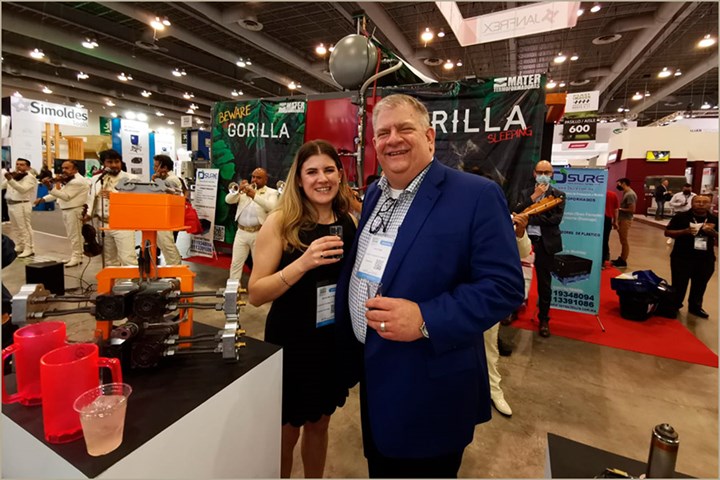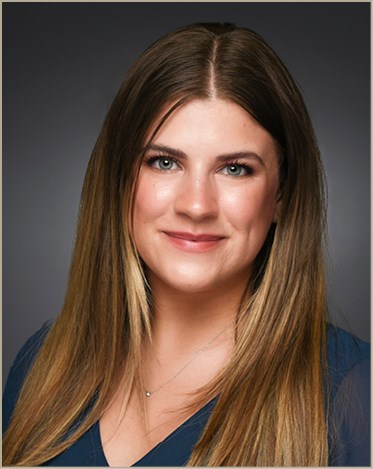”Lightbulb Moment:” Manufacturing Touches Everything
Madeline Kline, Regional Sales Manager, Gardner Business Media, discusses when she had the ‘lightbulb moment’ that a thriving manufacturing industry touches absolutely everything and benefits everyone. That manufacturing is, without a doubt, a high-tech industry, and she shares her excitement about how essential these processes are in supporting our daily lives.
Employee Spotlight Profile
Madeline Kline, Regional Sales Manager
I so vividly remember the tour I took of Castle Precision Manufacturing in Glasgow, Scotland during the summer of 2015. The tour was a part of a marketing internship I was completing with the Advanced Manufacturing Research Center, and my first introduction to precision manufacturing (I wrote a post for the Modern Machine Shop Blog detailing this visit).
This was not my first experience in a manufacturing facility, but it sticks out as a key memory. There was something about the smallness and intricacy of the parts they were making, and how important they were to the function of larger systems. I remember thinking, ‘there must be tons of precision manufactured parts in my cell phone, and even more in my computer, and even MORE in my car, and EVEN MORE in an airplane . . .’. This was where I had the ‘lightbulb moment’ that manufacturing touches absolutely everything.
Five years later, I found myself moving from Fort Myers, Florida to Washington, DC to begin my role at Gardner Business Media. I would be covering the East Coast sales territory for the Plastics Technology and MoldMaking Technology brands. I came to Gardner (with a D) from Gartner (with a T), where I was an Account Manager on the High-Tech team.

The Lincoln Memorial overlooking the National Mall in Washington, DC with my boyfriend, Graham.
When I accepted the position with Gardner, I am sure some former colleagues and clients wondered why I made the shift from ‘high-tech’ to the manufacturing industry. I would not be surprised if some have been concerned about posts I’ve shared on LinkedIn promoting the evil plastics industry. There are clearly a lot of misconceptions about manufacturing (and plastics), but there is one point I wish more people understood:
Manufacturing is, without a doubt, a high-tech industry.
This is not news to anyone working in the industry – we witness it every day. We see it when reading the content our editors publish, when we see new technology at trade shows and conferences, and when visiting customers at their facilities. Manufacturers are working with speed and agility to bring products to market faster than ever before, and these products are being developed with efficiency and sustainability at top of mind. We know there is no shortage of innovation in the manufacturing industry.
Since joining the Plastics Technology team, I have had the opportunity to hear industry professionals introduce exciting technologies in plastics processing and recycling. Experts in sustainability and environmental engineering are addressing important challenges and bringing new ideas to the market. I have learned about engineering developments in chemical recycling, innovation in bioplastics, and futuristic ideas like digital watermarking and the industrial Internet of Things. I have also learned more about the root causes of plastic waste, and the many steps this industry is taking to address them (such as the PLASTICS Industry Association’s ‘Operation Clean Sweep,’ which is helping to eliminate pellet waste from manufacturing facilities).

Plastimagen 2022 in Mexico City with my dad, Rick Kline, CEO, Gardner Business Media.
Photo Credit: Natalia Ortega
Throughout my life I have made plenty of decisions that I believed were in the best interest of the environment. I have chosen to throw things into the recycling bin that were definitely not recyclable, in the hopes that maybe my local facility would be able to do something with them (I figured it was better than throwing them in the trash, which I now know is far from true). I have also bought into the cynical, belief that recycling is pointless, and everything ends up in the landfill anyways. I have chosen to buy boxed, canned and even glass bottles of water to reduce the amount of plastic I consume, assuming that these materials are better for the environment than a PET plastic bottle. I have done the same with paper bags at the grocery store, because somewhere I heard that was the right thing to do, and when I heard that I did not ask any questions.
Fortunately, there is plenty of information available when it comes to understanding how plastics impact the planet. For example, the management consulting firm McKinsey & Company recently published a study about the ‘Climate impact of plastics’, in which they found that ‘Plastics have lower total greenhouse gas contribution in almost all cases [they] examined’. Plastic packaging empowers us to cut down on food waste, which contributes to greenhouse gas emissions. Plastic, especially single use plastic, is vital to maintaining sanitary conditions in hospitals and other medical care facilities. It is a key material in building our electronics, cars, appliances, the list goes on and on. All of this is to say, plastic manufacturing is essential to the function of our daily lives.
It is exciting to be part of an industry that truly touches everything. Knowing the people and the processes that go into manufacturing things we all rely on every day has given me a broad perspective on our impact. There is also a deep appreciation for the time and thought that goes into bringing products to market. I think people who have misconceptions about our industries would feel differently if they were to experience these ‘lightbulb moments.’ When you can recognize how essential these processes are in supporting our daily lives, you realize that a thriving manufacturing industry benefits everyone.
Need more information?
Madeline Kline, Regional Sales Manager
Gardner Business Media, Inc.
513-527-8950 800-950-8020
LinkedIn
About the Author
Madeline Kline
Madeline is a Regional Sales Manager at Gardner Business Media, Inc. representing the Plastics Technology and Moldmaking Technology brands. She is a fifth-generation descendant of Gardner’s founder, Don Gardner. Madeline graduated from High Point University with majors in Business Administration and English Writing, and a minor in Sales. She has a background in account management and new business development. As a Regional Sales Manager, Madeline aligns media and advertising solutions to her customers’ marketing objectives, helping them build and maintain strong brand presence in the plastics and moldmaking markets.
RELATED CONTENT
-
Getting Comfortable Outside of my Comfort Zone
Digital Assistant Editor Nate Fields describes his path toward working in the manufacturing industry.
-
10 Truths About Marketing After the Pandemic
The Covid-19 pandemic upended a marketer’s playbook, challenging the existing rules about customer relationships and building brands. One year in, there’s no going back to the old normal. Here are 10 new marketing truths that reveal the confluence of strategies, operations, and technologies required to drive growth in a post-Covid-19 world.
-
Finding Opportunities in the Chaos
2020 has been a disruptive year, but one that will likely contribute to greater 3D printing adoption and more sustainable manufacturing. Stephanie Hendrixson, Senior Editor for Additive Manufacturing and Co-Host of The Cool Parts Show, writes about accelerating trends in AM and staying flexible in the face of a pandemic.


